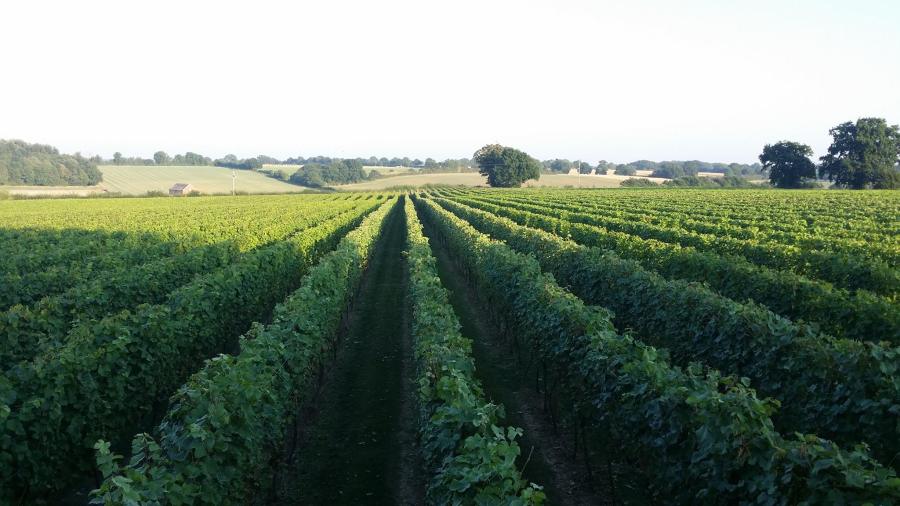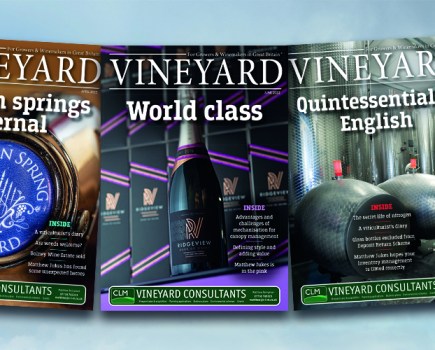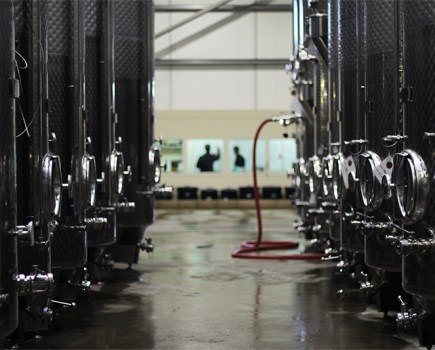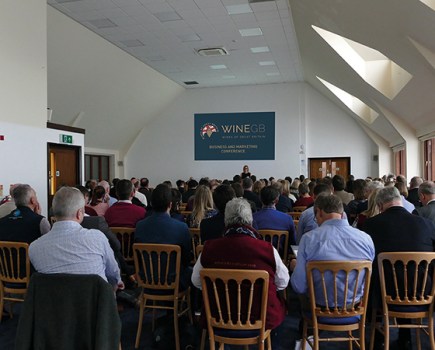Editor Victoria Rose visits Winbirri Vineyard, home of the ‘award-winning’ English Bacchus.
Putting East Anglia firmly on the wine growing map and helping to drive a surge in Bacchus sales nationwide, Lee Dyer at Winbirri Vineyard in Norfolk reflects on winning the 2017 Decanter platinum best in show award.
Receiving 10 years’ worth of orders in just six hours is surely every winemaker’s dream. For Lee Dyer at Winbirri Vineyard, Norfolk, this reality came to fruition last summer after his 2015 Bacchus was awarded the prestigious platinum best in show Decanter World Wine Award for the best value white single-varietal.
“We received 10,000 emails in the first 48 hours, all with orders. We were absolutely flooded and only cleared through the backlog in November,” said Lee, winemaker at Winbirri. “We went from being a small, local vineyard to being known across the country and the world in a matter of hours.”
Sparking as much interest amongst the press as from buyers, Lee’s attempt to ‘try his hand’ at public relations and deal with journalists direct certainly paid off. One of the major success stories in the English still wine world was covered by five national newspapers, the BBC, ITV and it even attracted a French news channel who flew out to report direct from East Anglia.
“For every phone call I answered, I was missing five or six. It just went crazy,” said Lee. “I was doing a radio interview nearly every hour and at one point I had three different news crews on the balcony overlooking the vineyard. It was all just very surreal, especially when the 1 o’clock BBC news team barged in front of them all because they were just about to go live.”
While Lee was busy managing the enquiries at the winery, it was not until he returned home that evening and looked at social media before he could fully appreciate the true scale of the news and the buzz it had created, not just for Winbirri but for English still wine and the variety Bacchus.
Not about ‘cashing in’
Humbled by the results, Lee credits the three Decanter judges in the final round for having “the power to completely change someone’s business over night” but the process has not simply been about ‘cashing in’ from the overnight boost in sales enquiries.
“We haven’t taken on any new big accounts and we didn’t put the price up either,” said Lee. “We decided to look after those people who had been with us from day one. I had made that wine to be that price, and although I still would have sold out in a day if I had put the price up to £40 per bottle, I would have annoyed a lot of customers who have supported us over the years. We would have gained a new breed of customer, but the question is then, would they return for another year when you haven’t got that medal or sticker on the bottle?”
Stocks of the 2015 Bacchus are now under close surveillance, reserved solely for mail orders and can only be purchased as part of a mixed case of Winbirri’s other wines. By trying to increase the longevity of the stocks, Lee has also successfully used this tactic to put his other wines in front of new customers.
“The post-win orders were very flattering but almost useless because we couldn’t make any more 2015,” said Lee. “By restricting the sale of the Bacchus (both 2015 and 2016 vintages) to mixed cases it has helped to get the other wines in front of customers. Wine is very personal, it’s not just about liking what someone has told you is the best and a lot of people who have purchased a mixed case have ended up preferring some of our other wines.”
Accommodating cellar door sales
Despite having a background in sales, Lee Dyer doesn’t ‘go out to sell’ and now focuses entirely on the winemaking and promotes the brand through various tasting events, which has generated entirely ‘organic’ sales growth.
Suppliers to Waitrose and a number of independent local retailers and high-end restaurants, Winbirri, who doesn’t advertise cellar door sales or have an official vineyard shop, suddenly found the need to accommodate private customers in search of the 2015 Bacchus.
“We started by doing nearly all wholesale and just dealing with the trade. We weren’t dealing with the public direct but things had to change after the award because people just started turning up out of the blue on the door step of the winery,” said Lee.
In dealing with the Decanter demand it is no surprise that it has been a very good year for sales at Winbirri, but the wider publicity generated for Bacchus has also sent sales for the variety rocketing around the country.
“Vineyards from all over have been in touch to say that our platinum win has also done them a lot of good,” said Lee. “People are now
aware of Bacchus and that as a variety it is capable of winning such an award. The public have awakened to the fact that it can’t just be one Bacchus that’s very good and there are many others out there.”
Bacchus just performs
With every commercial release of Winbirri Bacchus winning a silver medal or higher so far, this was certainly not a one-off victory for the estate and while many vineyards are focused solely on the sparkling markets, Lee sees a strong future for still English wines.
“Bacchus just performs so well on our site and I think it has potential to outgrow the sparkling,” said Lee. “We do very well with sparkling wines but how many £30 bottles of fizz does the average person actually drink per year compared to how many bottles of still wine? The market potential in my mind is such that you can’t ignore the still wine, which is why we are concentrating on both sides.”
Decanter World Wine Awards 2017
Platinum – Best in Show: Best Value White Single-Varietal for Bacchus 2015
East Anglian Wine of the Year Awards 2016
Gold Medal Bacchus 2015
UK Wine of the Year Awards 2016
Gore-Brown Trophy (Most outstanding Wine of the UK) Bacchus 2015
Jack Ward Memorial Salver (Most outstanding large production wine) Bacchus 2015
Tom Day Trophy (Most outstanding single varietal wine) Bacchus 2015
Berwick Trophy (Most outstanding large production unchaptalised still wine) Bacchus 2015
Gold Medal Bacchus 2015
Out in the vineyard
Confidence in the future for the English still wine can be seen right through Winbirri’s 33-acre vineyard and although there are plantings of Chardonnay, Pinot noir and Meunier for the estate’s sparkling blend, the majority of the site is dedicated to still varietals Bacchus, Solaris, Seyval blanc, Rondo, Regent and Dornfelder.
“Before we planted the last vineyard we were about 40% red wine production, which bucks the trend quite considerably in England,” said Lee. “Now we have 40% Bacchus, 15% Solaris, 20% sparkling varieties and the rest reds.”
Located in East Anglia, one of the driest and sunniest regions in England, the estate is nestled in the small village of Surlingham in Norfolk, Winbirri occupies land partially surrounded by a meander in the river which Lee believes helps to create a microclimate.
According to the Met Office, in September 2016 there was 141.8 hours of sunshine and 45.3mm of rainfall recorded in East Anglia, with 139.4 hours of sunshine and 50.9mm of rainfall recorded in the South East and Central South of England.
“We have more hours of sunshine, in September there is very little rainfall and we rarely have a wet harvest, which is a big difference to other parts of the country,” said Lee. “If you look at where most of the Bacchus is planted it’s in East Anglia and we often sell our fruit to other wineries, including one of the big three sparkling producers.”
While the weather certainly helps, there are a huge combination of factors which go into making Winbirri’s award-winning wines. Knowing what works well on his site, out in the vineyard Lee is working on a Double Guyot, six bud system giving him the ability to control yields very closely.
“I would rather grow less and make better wine so I try and keep our yields to under two tonnes per acre,” said Lee. “With this system, we are not over loading the vines, we are not making them crop too heavily per plant, we are keeping the yield low and forcing more competition between the vines as they are packed in closer. Although it is probably a more expensive set up, going forward it creates a better wine.”
Site selection
Having returned home from a stint in Thailand to find that his father Stephen Dyer had planted 200 vines on a small site owned by the family, the base for the winery and hub for the estate was largely dictated by what was available at the time.
“The original plantings were Madeleine x Angevine 7672, which is a nice grape in areas but not a Bacchus. There was also some Siegerrebe, which is all now gone and some Rondo which we still use,” said Lee. “The family already had the initial site where the winery now is and acquired new sites in 2010.”
In 2010 a 9-acre site was planted with 17,000 vines of Bacchus, Chardonnay, Pinot noir, Meunier, Dornfelder, Rondo, Regent and Solaris, with another block planted in 2012 and the latest plantings have increased the Bacchus by 10,000 vines and the Pinot noir by 2,000.
As the acreage expands, Lee has been able to carefully select the estate’s additional sites.
“We have gone after particularly rubbish soils and are on really light sandy loams which force that root structure to grow down. We are also growing grass to add to competition, reduce soil erosion and moisture,” said Lee.
Surrounded by lower lying fields with a low risk of frost to contend, and a small, but manageable threat from rabbits and wild deer in the area, Lee keeps his pest issues in check with relative ease and even admits to having some good red wines to pair with venison. For Winbirri the main threat is from diseases, but through control with careful spraying, good canopy management and tucking in by hand the disease pressure is reduced.
Having grown out of the original warehouse building in just seven years, new storage facilities were erected in 2015, but with current production levels at around 80,000 bottles per year and with increased plantings waiting to come into production, Lee is once again running out of space.
Expansion and investment
Expansion and investment can also be seen within the winery with the installation of new disgorging facilities this year and further plans in the pipeline. With 24 stainless steel tanks currently in situ, Lee is hoping to add another line of larger sized tanks in the winery as well as a new press.
“Our current grape press needs to go; it is far too small!” said Lee. “We are hoping to get a new press probably about four times the size. At the moment with the Bacchus harvest I will be pressing for 72 hours straight which is quite a shift.”
With Brexit having contributed to the crash of the pound and all of Winbirri’s equipment being imported from Europe, the expansion plans have been costlier than initially anticipated with the bottling and disgorging line costing around £20,000 more than the original quote.
Investment costs aside, Winbirri is now fully equipped to do all its sparkling wine production in house and while in the past, sparkling has only been produced in small batches, November 2017 saw the release of the 2013 Vintage Reserve, the estate’s ‘first big batch’ sparkling white.
“We’re really pleased with the new sparkling,” said Lee. “We have gone quite heavy on the Pinot noir in the blend because I like the fruit expression it gives. I know it is the lower yielding of the three, thus making it more expensive in production, but that is the way I wanted to take it and I prefer the outcome of a bit more fruit coming through.”
Attention to detail
After studying at Plumpton College, Lee decided to start his wine making career at Winbirri with father Stephen, who is still heavily involved in the running of the estate. Lee found he was able to make, and more importantly learn from, his own mistakes without being tarnished by anyone else’s methods.
“I wanted a clean slate,” said Lee. “I had a vision of how I wanted to produce our wines and kept to it. You never stop learning and I will make sure that I work harder and longer to improve. Even if I have to work a 90-hour work week, I will pay attention to detail and keep going until the job is done. We have got to where we are by having our morals and ethics of doing things a certain way and not changing and that is what I put our success down to.”
Taking a minimal intervention approach to the wine making, Lee gets nature to do most of the work and puts the ‘secret to his success’ down to his intense level of attention to detail.
“I am a keen believer that it doesn’t matter how insignificant it looks, if it is going to make the wine better it will get done and that approach appears to be paying off,” said Lee. “We don’t cut any corners; with the reds, for instance, we’ll do one year tank, one year barrel and then one year bottle aging. Opting for American Oak on three year rotations may add a big expense onto the production costs but the results are paying off.”
With the recipe for success consolidated, and 2017 bringing a ‘nice and clean’ harvest which finished two and a half weeks earlier than expected, with ‘another nice vintage coming on’ Winbirri is set to continue on its growth trajectory.




